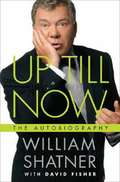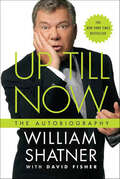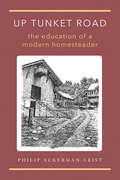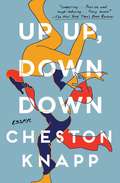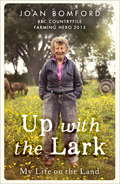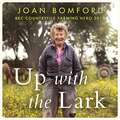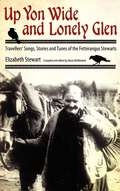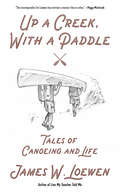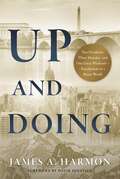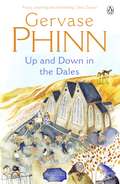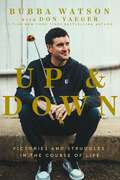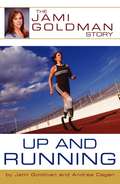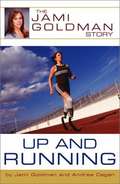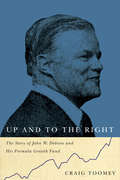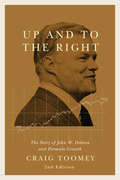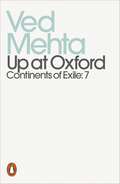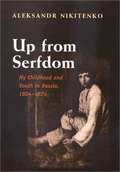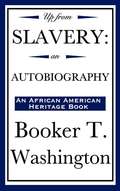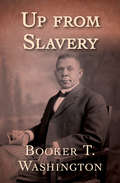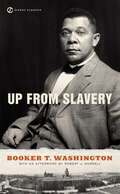- Table View
- List View
Up Till Now: The Autobiography
by William Shatner David FisherThe autobiography of the famous TV, movie and theater star, who has played roles such as Captain James T. Kirk, Denny Crane, the Priceline negotiator, T. J. Hooker, and more.
Up Till Now: The Autobiography
by William Shatner David FisherAfter almost sixty years as an actor, William Shatner has become one of the most beloved entertainers in the world. And it seems as if Shatner is everywhere. In Up Till Now, Shatner sits down with readers and offers the remarkable, full story of his life and explains how he got to be, well, everywhere. It was the original Star Trek series, and later its films, that made Shatner instantly recognizable, called by name---or at least by Captain Kirk's name---across the globe. But Shatner neither began nor has ended his career with that role. From the very start, he took his skills as an actor and put them to use wherever he could. He straddled the classic world of the theater and the new world of television, whether stepping in for Christopher Plummer in Shakespeare's Henry V or staring at "something on the wing" in a classic episode of The Twilight Zone. And since then, he's gone on to star in numerous successful shows, such as T.J. Hooker,Rescue 911, and Boston Legal. William Shatner has always been willing to take risks for his art. What other actor would star in history's first---and probably only---all-Esperanto-language film? Who else would share the screen with thousands of tarantulas, release an album called Has Been, or film a racially incendiary film in the Deep South during the height of the civil rights era? And who else would willingly paramotor into a field of waiting fans armed with paintball guns, all waiting for a chance to stun Captain...er, Shatner?In this touching and very funny autobiography, William Shatner's Up Till Now reveals the man behind these unforgettable moments, and how he's become the worldwide star and experienced actor he is today."It is now Bill Shatner's universe---we just live in it."---New York Daily News
Up Tunket Road
by Philip Ackerman-LeistEver since Thoreau's Walden, the image of the American homesteader has been of someone getting away from civilization, of forging an independent life in the country. Yet if this were ever true, what is the nature and reality of homesteading in the media-saturated, hyper-connected 21st century? For seven years Philip Ackerman-Leist and his wife, Erin, lived without electricity or running water in an old cabin in the beautiful but remote hills of western New England. Slowly forging their own farm and homestead, they took inspiration from their experiences among the mountain farmers of the Tirolean Alps and were guided by their Vermont neighbors, who taught them about what it truly means to live sustainably in the postmodern homestead-not only to survive, but to thrive in a fragmented landscape and a fractured economy. Up Tunket Roadis the inspiring true story of a young couple who embraced the joys of simple living while also acknowledging its frustrations and complexities. Ackerman-Leist writes with humor about the inevitable foibles of setting up life off the grid-from hauling frozen laundry uphill to getting locked in the henhouse by their ox. But he also weaves an instructive narrative that contemplates the future of simple living. His is not a how-to guide, but something much richer and more important-a tale of discovery that will resonate with readers who yearn for a better, more meaningful life, whether they live in the city, country, or somewhere in between.
Up Up, Down Down: Essays
by Cheston KnappFor fans of John Jeremiah Sullivan and Wells Tower, a “glittering,” (Leslie Jamison), “always smart, often hilarious, and ultimately transcendent” (Anthony Doerr) linked essay collection from the managing editor of Tin House that brilliantly explores the nature of identity.Daring and wise, hilarious and tender, Cheston Knapp’s exhilarating collection of seven linked essays, Up Up, Down Down, tackles the Big Questions through seemingly unlikely avenues. In his dexterous hands, an examination of a local professional wrestling promotion becomes a meditation on pain and his relationship with his father. A profile of UFO enthusiasts ends up probing his history in the church and, more broadly, the nature and limits of faith itself. Attending an adult skateboarding camp launches him into a virtuosic analysis of nostalgia. And the shocking murder of a neighbor expands into an interrogation of our culture’s prevailing ideas about community and the way we tell the stories of our lives. Even more remarkable, perhaps, is the way he manages to find humanity in a damp basement full of frat boys. Taken together, the essays in Up Up, Down Down amount to a chronicle of Knapp’s coming-of-age, a young man’s journey into adulthood, late-onset as it might appear. He presents us with formative experiences from his childhood to marriage that echo throughout the collection, and ultimately tilts at what may be the Biggest Q of them all: what are the hazards of becoming who you are? With “an ordnance of wit” (Wells Tower) and “a prose style that feels both extravagant and exact, and a big, booming heart” (Maggie Nelson), Up Up, Down Down signals the arrival of a truly one-of-a-kind voice.
Up With The Lark: My Life On the Land
by Joan Bomford'An evocative portrait of a forgotten period of Britain's farming history... is an ode both to the soil, and those who have worked it alongside her' Daily TelegraphJoan Bomford wanted to be a farmer so much she always wore a tie like her dad. She ran away from school whenever she could to help him. As an 8 year-old she was the first person in the family to drive a tractor. No job was ever too tough for her. Now aged 83, she's still as active, still driving tractors, still feeding the farm's beef cattle and horses, and still giving riding lessons.This is her account of a lifelong love-affair with the land and the people who work on it. With the warmth and wit of a born story teller, she tells us what it's been like to live through an era of enormous change, her love of animals kindled by her father's shire horses who did all the heavy work until machinery took over. Up With The Lark is not only the portrait of a forgotten era, but also the story of one woman's overwhelming desire to do the thing she cared about more than anything else - being Farmer Joan.
Up With The Lark: My Life On the Land
by Joan Bomford'An evocative portrait of a forgotten period of Britain's farming history... is an ode both to the soil, and those who have worked it alongside her' Daily TelegraphJoan Bomford wanted to be a farmer so much she always wore a tie like her dad. She ran away from school whenever she could to help him. As an 8 year-old she was the first person in the family to drive a tractor. No job was ever too tough for her. Now aged 83, she's still as active, still driving tractors, still feeding the farm's beef cattle and horses, and still giving riding lessons.This is her account of a lifelong love-affair with the land and the people who work on it. With the warmth and wit of a born story teller, she tells us what it's been like to live through an era of enormous change, her love of animals kindled by her father's shire horses who did all the heavy work until machinery took over. Up With The Lark is not only the portrait of a forgotten era, but also the story of one woman's overwhelming desire to do the thing she cared about more than anything else - being Farmer Joan.
Up With The Lark: My Life On the Land
by Joan Bomford'An evocative portrait of a forgotten period of Britain's farming history... is an ode both to the soil, and those who have worked it alongside her' Daily TelegraphJoan Bomford wanted to be a farmer so much she always wore a tie like her dad. She ran away from school whenever she could to help him. As an 8 year-old she was the first person in the family to drive a tractor. No job was ever too tough for her. Now aged 83, she's still as active, still driving tractors, still feeding the farm's beef cattle and horses, and still giving riding lessons.This is her account of a lifelong love-affair with the land and the people who work on it. With the warmth and wit of a born story teller, she tells us what it's been like to live through an era of enormous change, her love of animals kindled by her father's shire horses who did all the heavy work until machinery took over. Up With The Lark is not only the portrait of a forgotten era, but also the story of one woman's overwhelming desire to do the thing she cared about more than anything else - being Farmer Joan.(P)2015 Hodder & Stoughton
Up Yon Wide and Lonely Glen: Travellers' Songs, Stories and Tunes of the Fetterangus Stewarts
by Elizabeth StewartElizabeth Stewart is a highly acclaimed singer, pianist, and accordionist whose reputation has spread widely not only as an outstanding musician but as the principal inheritor and advocate of her family and their music. First discovered by folklorists in the 1950s, the Stewarts of Fetterangus, including Elizabeth's mother Jean, her uncle Ned, and her aunt Lucy, have had immense musical influence. Lucy in particular became a celebrated ballad singer and in 1961 Smithsonian Folkways released a collection of her classic ballad recordings that brought the family's music and name to an international audience. Up Yon Wide and Lonely Glen is a significant memoir of Scottish Traveller life, containing stories, music, and songs from this prominent Traveller family. The book is the result of a close partnership between Elizabeth Stewart and Scottish folk singer and writer Alison McMorland. It details the ancestral history of Elizabeth Stewart's family, the story of her mother, the story of her aunt, and her own life story, framing and contextualizing the music and song examples and showing how totally integrated these art forms are with daily life. It is a remarkable portrait of a Traveller family from the perspective of its matrilineal line. The narrative, spanning five generations and written in Scots, captures the rhythms and idioms of Elizabeth Stewart's speaking voice and is extraordinary from a musical, cultural, sociological, and historical point of view. The book features 145 songs, eight original piano compositions, folktale versions, rhymes and riddles, and eighty fascinating illustrations, from the family of Elizabeth, her mother Jean (1912–1962) and her aunt Lucy (1901–1982). In addition, there are notes on the songs and a series of appendices. Up Yon Wide and Lonely Glen will appeal to those interested in traditional music, folklore, and folk song—and in particular, Scottish tradition.
Up a Creek, with a Paddle: Tales of Canoeing and Life
by James W. LoewenUp a Creek, With a Paddle is an intimate and often humorous memoir by the author of Lies My Teacher Told Me, James W. Loewen, who holds the distinction of being the best-selling living sociologist today. Rivers are good metaphors for life, and paddling for living. In this little book, Loewen skillfully makes these connections without sermonizing, resulting in nuggets of wisdom about how to live, how to act meaningfully, and perhaps how to die. Loewen also returns to his life's work and gently addresses the origins of racism and inequality, the theory of history, and the ties between the two. But mostly, as in his life, he finds rueful humor in every canoeing debacle—and he has had many! "A memoir like no other. I laughed at his delightful stories of canoeing fiascos that repeatedly answered his question, "What could possibly go wrong?" In quieter intervals, I learned from his reflections on history, ethics, and race relations. About death he is funny but unflinching. His spirit will live on, though, in the ways that history is told. This book's energy can sustain and inspire those who follow." —Peggy McIntosh, author of White Privilege
Up and Doing: Two Presidents, Three Mistakes, and One Great Weekend—Touchpoints to a Better World
by James HarmonFrom championing developing nations to funding our carbon-free future, investor and advisor James Harmon reveals how markets can move the world forward by creating stable, growing economies and sound deals that promote economic development.James Harmon has always had a passion for ambitious causes. As a banker, he successfully advised corporations, like Starbucks, and helped them to become cultural institutions. Dabbling in the movie and music industries, he found meaning in funding the art he felt would make people happy and add to the public good. His unique perspective on investment led him to the Clinton White House as head of EXIM Bank and, eventually, to Egypt, where he represented the State Department shortly after the Arab Spring. Still "up and doing," today he cochairs the board of the World Resources Institute. Not all of Harmon's deals were successes, and he recounts the wins and losses in equal detail, exposing lessons learned, and even sharing a few farcical scenes featuring Washington's and Wall Street's most notorious bold-face names. No matter where he is replanted, Harmon advocates for global change by examining the issues of our time, including women's financial empowerment and the urgent need to fight climate change. He encourages our leaders to apply lessons learned in the private sector to the world's most demanding challenges, from helping a local community to electing a president or bolstering a developing African nation.Up and Doing presents a tale of the deals that made Harmon a celebrated figure in the world of global investment, and shows that the best way to do well is by also doing good.
Up and Down in the Dales
by Gervase PhinnEscape to the country with Gervase Phinn's heartwarming tales of life as a school inspector in Yorkshire'Gervase Phinn's memoirs have made him a hero in school staff-rooms' Daily Telegraph______What's your name? I asked the child.'Tequila,' she replied. I'm named after a drink.''Tequila Sunrise,' I murmured.'No,' pouted the child. 'Tequila Braithwaite.'Now in his fourth year as an Inspector for English in the Yorkshire Dales, Gervase Phinn still relishes visiting the schools - whether an inner-city comprehensive fraught with difficulties or a small Dales Primary school where the main danger is one of closure. With endless good humour, he copes with the little surprises that occur round every corner.Some things never change: Mrs Savage roars, Connie rants, and Gervase's colleague in the office play verbal ping-pong. But all this can be put behind him each day when he returns home to his lovely wife, Christine, who is expecting their first baby.Up and Down in the Dales is charming montage of Gervase Phinn's experiences will keep you amused and will win a place in your heart.Gervase Phinn has an extraordinary talent to entertain, and the latest instalment to the Dale Series is heart-warming, wry and will make you laugh out loud.
Up and Down: Victories and Struggles in the Course of Life
by Bubba WatsonHe was a small-town boy who burst onto the international golf scene with a dramatic hook shot from deep in the woods to win the Masters— before the game he loved almost killed him. Opening up about the toll that chasing and achieving his dream of being a champion golfer took on his mental health, Bubba Watson shares his powerful story of the breaking point that gave him clarity. Bubba Watson is known as the big-hitting left-handed golfer who plays with the pink driver—the small-town kid who grew up as a child golf prodigy before going on to win two Masters Tournaments, competing in the Olympics, and rising to be the number two golfer in the world. But every dream comes with a price. Feeling that he was never good enough, Bubba began to let the constant criticism from fans and commentators haunt his thoughts. Success in the game he loved was killing him.In Up and Down, Bubba opens up about his debilitating anxiety attacks, the death of his father and namesake, adopting his children, and how reaching a breaking point professionally and personally drew him closer to his family and God. Golf is what Bubba Watson does, but it is not who he is. Through his story, you&’ll learn how Bubba: Overcame his anxiety and feelings of inadequacy Found his true identity not in the standards of the world, but in the God who already knows he is enough Learned to trust God with his gifts, family, and biggest dreams Became the husband, father, friend, and mentor he was called to be Life, like golf, is filled with ups and downs. Up and Down is the inspiring story of an imperfect man striving to become the best person he can be—wherever the course may take him.
Up and Running
by Andrea Cagan Jami GoldmanMore than a decade ago, while driving through Arizona, nineteen-year-old Jami and a friend took a wrong turn in their Chevy Mini-Blazer. They spent the next eleven days stranded and fighting for their lives on a logging road that the state had closed--without first being checked for travelers in distress--during a blinding snowstorm. Here, Jami shares the trauma of those endless days , the miracle of a stunning rescue, the grief over losing her legs, and the strength and courage it has taken not only to walk again but also to run like the wind. Wise, forthright, and astonishing, Up and Running recounts Jami's physical, emotional, and legal battles ( she filed a suit against the state) and shows how she used adversity as a stepping-stone to her recovery while also discovering love and joy beyond her wildest dreams.
Up and Running: The Jami Goldman Story
by Andrea Cagan Jami GoldmanMeet tall, beautiful Jami Goldman: world-class athlete, Adidas spokesperson, motivational speaker -- and double amputee. More than a decade ago, a wrong turn on a back road during a blizzard resulted in a terrifying fight for her life. Now for the first time, Jami recounts her gripping story of being trapped in the snow for eleven endless days, the grievous loss of her legs, and the fortitude it has taken to not only walk again but run like the wind -- all the way to freedom. On December 23, 1987, nineteen-year-old Jami Goldman and her friend Lisa Barzano headed home from a ski trip in Purgatory, Colorado, never imagining they would end up in a freezing hell on a back road that the state of Arizona had closed without checking for travelers in distress. The girls' car battery died during that first long night, stranding them in below-zero temperatures. With only a cinnamon roll and a six-pack of frozen Diet Pepsi, the next ten days became an exercise in survival, testing their faith and courage even after they were rescued -- when Jami's legs and feet were deemed beyond saving. Wise, forthright, and astonishing, Up and Running follows Jami's global journey from loss to recovery. Her story, which often reads like a compelling mystery, features her supportive family and friends, a devastating court case, her passionate relationship with the man she married, and finally, her triumph over inconceivably fearful obstacles. In the end, Up and Running shows us all how to use adversity as a stepping-stone -- leading us to heights we previously considered out of reach and beyond our wildest dreams.
Up and to the Right
by Craig ToomeyIn 1960, Montreal stock broker John Dobson launched an informal investment club with a close group of friends and associates, including future prime minister John Turner. His Formula Growth Fund would go on to become one of North America's most successful investment funds, consistently outperforming the Dow Jones Industrial Average and attracting the likes of legendary investor Sir John Templeton. With a foreword by the Right Honourable David Johnston, Up and to the Right tells the story behind John Dobson's investment success as well as his many contributions to entrepreneurial education. Craig Toomey provides valuable insight into his unconventional but disciplined investment approach, his uncanny ability to predict winning stocks, and his unwavering faith in the market despite its many ups and downs. Based on interviews with Dobson as well as with dozens of members of his extensive network of friends, colleagues, and investment professionals, Up and to the Right is a fascinating story about a great Canadian who believed deeply in self-reliance and free enterprise as well as the value of friendship, pursuing one's passions, and working for the greater good.
Up and to the Right: The Story of John W. Dobson and Formula Growth Second Edition
by Craig ToomeyIn 1960, Montreal stock broker John Dobson launched an informal investment club with a close group of friends and associates, including future prime minister John Turner. His Formula Growth Fund would go on to become one of North America's most successful investment funds, consistently outperforming the Dow Jones Industrial Average and attracting the likes of legendary investor Sir John Templeton. Up and to the Right tells the story behind John Dobson's investment success as well as his many contributions to entrepreneurial education. Craig Toomey provides valuable insight into Dobson's unconventional but disciplined investment approach, his uncanny ability to predict winning stocks, and his unwavering faith in the market despite its many ups and downs. Coinciding with the sixtieth anniversary of the Formula Growth Fund, this revised edition brings the company's story up to 2019, presenting new material and case studies and describing recent developments, including how Formula Growth tripled its assets under management to $1.5 billion through the launch of a successful hedge fund platform and expansion into Asia. Based on interviews with Dobson as well as with dozens of members of his extensive network of friends, colleagues, and investment professionals, Up and to the Right is a fascinating story about a great Canadian who believed deeply in self-reliance and free enterprise as well as the value of friendship, pursuing one's passions, and working for the greater good.
Up and to the Right: The Story of John W. Dobson and Formula Growth Second Edition
by Craig ToomeyIn 1960, Montreal stock broker John Dobson launched an informal investment club with a close group of friends and associates, including future prime minister John Turner. His Formula Growth Fund would go on to become one of North America's most successful investment funds, consistently outperforming the Dow Jones Industrial Average and attracting the likes of legendary investor Sir John Templeton. Up and to the Right tells the story behind John Dobson's investment success as well as his many contributions to entrepreneurial education. Craig Toomey provides valuable insight into Dobson's unconventional but disciplined investment approach, his uncanny ability to predict winning stocks, and his unwavering faith in the market despite its many ups and downs. Coinciding with the sixtieth anniversary of the Formula Growth Fund, this revised edition brings the company's story up to 2019, presenting new material and case studies and describing recent developments, including how Formula Growth tripled its assets under management to $1.5 billion through the launch of a successful hedge fund platform and expansion into Asia. Based on interviews with Dobson as well as with dozens of members of his extensive network of friends, colleagues, and investment professionals, Up and to the Right is a fascinating story about a great Canadian who believed deeply in self-reliance and free enterprise as well as the value of friendship, pursuing one's passions, and working for the greater good.
Up and to the Right: The Story of John W. Dobson and His Formula Growth Fund
by Craig ToomeyIn 1960, Montreal stock broker John Dobson launched an informal investment club with a close group of friends and associates, including future prime minister John Turner. His Formula Growth Fund would go on to become one of North America's most successful investment funds, consistently outperforming the Dow Jones Industrial Average and attracting the likes of legendary investor Sir John Templeton. With a foreword by the Right Honourable David Johnston, Up and to the Right tells the story behind John Dobson's investment success as well as his many contributions to entrepreneurial education. Craig Toomey provides valuable insight into his unconventional but disciplined investment approach, his uncanny ability to predict winning stocks, and his unwavering faith in the market despite its many ups and downs. Based on interviews with Dobson as well as with dozens of members of his extensive network of friends, colleagues, and investment professionals, Up and to the Right is a fascinating story about a great Canadian who believed deeply in self-reliance and free enterprise as well as the value of friendship, pursuing one’s passions, and working for the greater good.
Up at Oxford: Continents of Exile: 7 (Penguin Modern Classics)
by Ved MehtaBook 2 in Ved Mehta's Continents of Exile series. Nearly 50 years in the making, Continents of Exile is one of the great works of twentieth-century autobiography: the epic chronicle of an Indian family in the twentieth century. From 1930s India to 1950s Oxford and literary New York in the 1960s-80s, this is the story of the post-colonial twentieth century, as uniquely experienced and vividly recounted by Ved Mehta.After studying in the United States, Mehta - blind since childhood - achieves his dream of enrolling at the University of Oxford: a place that has consumed his imagination ever since he was a small boy growing up under the British Raj. In Up at Oxford, Mehta recalls the nuances of his conversations, the range of his youthful emotions, and the sounds, smells, and tastes of university life. Along the way he draws memorable portraits of, among others, novelists, poets, scholars, and peers.
Up at the Lake: Summer Cottage Memories
by Robert AmosCanadian artist Robert Amos opens his scrapbook of watercolor paintings, sketches and old family photographs to give us a poetic and personal account of early childhood memories at a Muskoka Lakes cottage. Up at The Lake features read-along narration, natural soundscapes and music. Ages 4 - 8
Up from Serfdom: My Childhood and Youth in Russia, 1804-1824
by Helen Saltz Jacobson Aleksandr Nikitenko"Aleksandr Nikitenko, descended from once-free Cossacks, was born into serfdom in provincial Russia in 1804. One of 300,000 serfs owned by Count Sheremetev, Nikitenko as a teenager became fiercely determined to gain his freedom. In this book, here translated into English for the first time, Nikitenko recollects the details of his childhood and youth in servitude, as well as the six-year struggle that at last delivered him into freedom in 1824. Among the very few autobiographies ever written by an ex-serf, Up from Serfdom provides a unique portrait of serfdom in nineteenth-century Russia and a profoundly clear sense of what such bondage meant to the people, the culture, and the nation."--BOOK JACKET. Title Summary field provided by Blackwell North America, Inc. All Rights Reserved
Up from Slavery
by Booker T. WashingtonUp from Slavery is one of the most influential biographies ever written. On one level it is the life story of Booker T. Washington and his rise from slavery to accomplished educator and activist. On another level it the story of how an entire race strove to better itself. Washington makes it clear just how far race relations in America have come, and to some extent, just how much further they have to go. Written with wit and clarity.
Up from Slavery
by Booker T. WashingtonBooker T. Washington’s classic memoir of enslavement, emancipation, and community advancement in the Reconstruction Era. Born into slavery on a tobacco farm in nineteenth-century Virginia, Booker T. Washington became one of the most powerful intellectuals of the Reconstruction Era. As president of the Tuskegee Institute in Alabama, he advocated for the advancement of African Americans through education and entrepreneurship. In Up from Slavery, Washington speaks frankly and honestly about his enslavement and emancipation, struggle to receive an education, and life’s work as an educator. In great detail, Washington describes establishing the Tuskegee Institute, from teaching its first classes in a hen house to building a prominent institution through community organization and a national fundraising campaign. He also addresses major issues of the era, such as the Jim Crow laws, Ku Klux Klan, and “false foundation” of Reconstruction policy. Up From Slavery is based on biographical articles written for the Christian newspaper Outlook and includes the full text of Washington’s revolutionary Atlanta Exposition address. First published in 1901, this powerful autobiography remains a landmark of African American literature as well as an important firsthand account of post–Civil War American history. This ebook has been professionally proofread to ensure accuracy and readability on all devices.
Up from Slavery: An Autobiography
by Booker T. Washington Ishmael Reed"Up From Slavery" is the classic autobiography of one of the most controversial figures in American history, Booker T. Washington. It recounts Washington's rise from a Virginia tobacco farm slave to his long standing tenure as President of the famed Tuskegee Institute of Alabama. Washington's message is one of the advancement of African Americans through economic empowerment for as he put it, "the individual who can do something that the world wants done will, in the end, make his way regardless of his race." His message of self-empowerment has been a dramatic force in the fight for racial equality and shall forever be remembered in the annals of American history.
